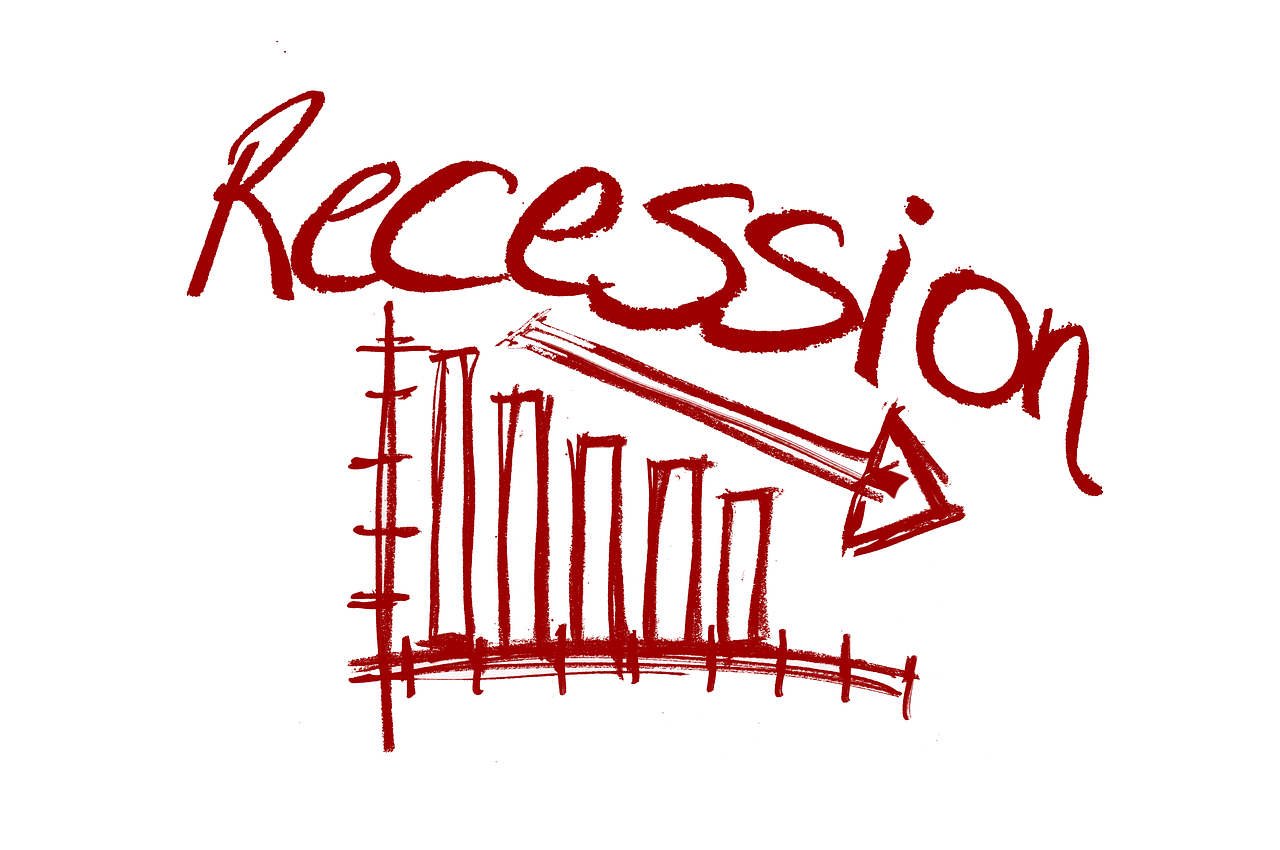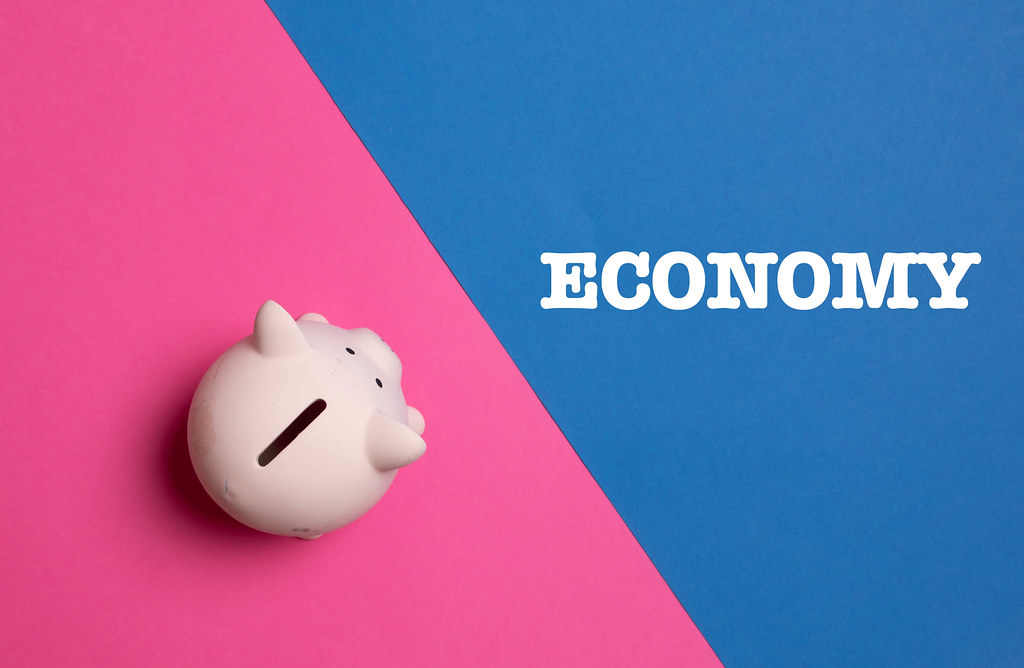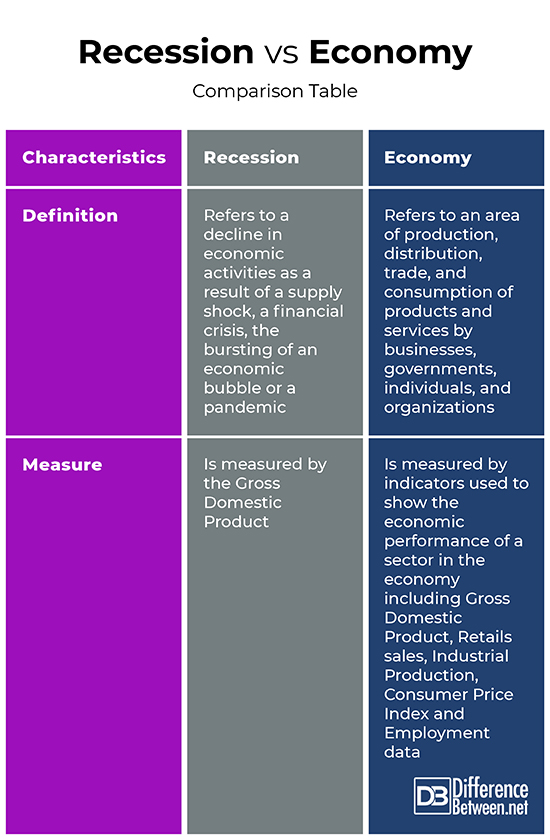Difference Between Recession and Economy
The totalactivities related to the production and consumption of products and services, commonly known as an economy, are affected by various players in the market. These can either negatively or positively impact various or all sectors in an economy. A booming economy results in a high levels of employment, high level of investments, a decrease in poverty, lower government borrowing, and an increase in business activities. However, a falling economy is seen in high levels of unemployment, increased government borrowing, a fall in the prices of assets not to mention a drop in incomes. A recession is said to have occurred when there is a decline in national income.

What is Recession?
This is a decline in economic activities as a result of a supply shock, a financial crisis, the bursting of an economic bubble or a pandemic. It is characterized by negatively impacting situations in the economy, and although recessions are rare, the impact on an economy is based on the level of the decline in output and how long it lasts. Recessions are measured through a decline in the Gross Domestic Product for two consecutive quarters.
Recessions affect the economy through:
- High levels of unemployment- A decline in economic activities forces firms to cut costs, which translates to high levels of unemployment.
- Low wages- During a recession, businesses may reduce costs through wage cuts as a means of surviving tough economic periods.
- High government borrowing- As a result of a decline in tax revenue from businesses, employees, and assets, government borrowing may increase to enable it carry to out administrative activities.
- A fall in the prices of assets- Due to poor confidence in the economy, the prices of assets decline.
To help an economy recover from a recession, the government may take measures such as increasing government spending and tax cuts in the most affected economic sectors. These strategies, however, vary between policymakers.

What is Economy?
This is an area of production, distribution, trade, and consumption of products and services by businesses, governments, individuals, and organizations. An economy largely depends on how a society structures it’s economic system, with the legal and political structures governing the accumulation and distribution of wealth. Economic indicators used to show the economic performance of a sector in the economy include Gross Domestic Product, Retails sales, Industrial Production, Consumer Price Index and Employment data.
Types of economies
- Traditional economy- This is an economy build around the beliefs and customs of a community in the production of products and services. They believe in their ancestors’ practices and continue with their habits and practices.
- Capitalist economy- This is an economic system where the consumer practices base the production of products and services.
- Command economy- This is an economy run and controlled by the government. The decision such as products to manufacturing, the manufacture process, pricing, and supply are all controlled by the government.
- Mixed economy – This is a combination of the command and the free market. Here, the government interferes with the economy but does not have full control.
Although economic disruptions are common, the severity differs. A recession, for instance negatively affects an economy leading to economic scarring. These affect all sectors of livelihoods including education, lost job opportunities, a decline in economic activities not to mention the decline in business activities. Recessions also limit leisure; hence affect industries such as tourism and entertainment.
Similarities between Recession and Economy
- Both refer to the state of economic conditions and activities
Differences between Recession and Economy
Definition
Recession refers to a decline in economic activities as a result of a supply shock, a financial crisis, the bursting of an economic bubble or a pandemic. On the other hand, an economy refers to an area of production, distribution, trade, and consumption of products and services by businesses, governments, individuals, and organizations.
Measure
While a recession is measured by the Gross Domestic Product, an economy is measured by indicators used to show the economic performance of a sector in the economy including Gross Domestic Product, Retails sales, Industrial Production, Consumer Price Index and Employment data.
Recession vs. Economy: Comparison Table

Summary of Recession vs. Economy
Recession refers to a decline in economic activities as a result of a supply shock, a financial crisis, the bursting of an economic bubble or a pandemic. On the other hand, an economy refers to an area of production, distribution, trade, and consumption of products and services by businesses, governments, individuals, and organizations. Recessions have adverse effects on an economy including job losses, a fall in the price of assets, increased government borrowing and loss of income.
- Difference Between Profit Center and Investment Center - July 2, 2022
- Difference Between Anti-Trust and Anti-Competition - June 6, 2022
- Difference Between Stocktaking and Stock Control - June 6, 2022
Search DifferenceBetween.net :
Leave a Response
References :
[0]Baird Webel. Emergency Economic Stabilization Act and Current Financial Turmoil: Issues and Analysis. DIANE Publishing, 2011. https://books.google.co.ke/books?id=oPEjsjaASYgC&pg=PA26&dq=disruption+of+economic+activities+by+recessions&hl=en&sa=X&ved=0ahUKEwjDsbOTubHoAhVMdcAKHc1xAzgQ6AEIZjAH#v=onepage&q=disruption%20of%20economic%20activities%20by%20recessions&f=false
[1]Baird Webel. Emergency Economic Stabilization Act and Current Financial Turmoil: Issues and Analysis. DIANE Publishing, 2011. https://books.google.co.ke/books?id=oPEjsjaASYgC&pg=PA26&dq=disruption+of+economic+activities+by+recessions&hl=en&sa=X&ved=0ahUKEwjDsbOTubHoAhVMdcAKHc1xAzgQ6AEIZjAH#v=onepage&q=disruption%20of%20economic%20activities%20by%20recessions&f=false
[2]Knoop T. Recessions and Depressions: Understanding Business Cycles. Greenwood Publishing Group, 2004. https://books.google.co.ke/books?id=Ak_PQO2NprUC&printsec=frontcover&dq=effects+of+recessions+on+the+economies&hl=en&sa=X&ved=0ahUKEwiam_XbuLHoAhVSolwKHaZWAzMQ6AEITTAF#v=onepage&q=effects%20of%20recessions%20on%20the%20economies&f=false
[3]Nabli M. The Great Recession and Developing Countries: Economic Impact and Growth Prospects. World Bank Publications, 2010. https://books.google.co.ke/books?id=2CSyshhQuS8C&printsec=frontcover&dq=effects+of+recession+on+the+economy&hl=en&sa=X&ved=0ahUKEwiUvuK2uLHoAhVIiFwKHbe9AF4Q6AEIUDAF#v=onepage&q=effects%20of%20recession%20on%20the%20economy&f=false
[4]Image credit: https://live.staticflickr.com/65535/48054562618_9f3debc704_b.jpg
[5]Image credit: https://storage.needpix.com/rsynced_images/recession-2530812_1280.png
